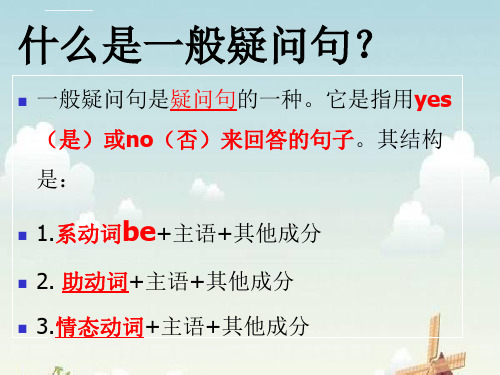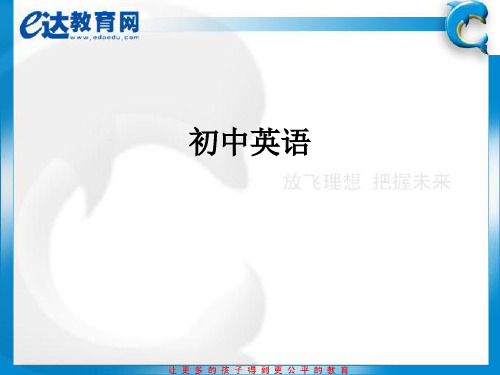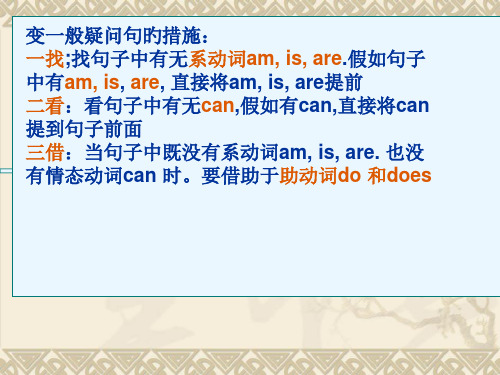一般疑问句ppt课件
合集下载
英语六年级一般疑问句课件ppt

2. 助动词+主语+其他成分 3.情态动词+主语+其他成分
从 使 用 情 况 来看, 闭胸式 的使用 比较广 泛。敞 开式盾 构之中 有挤压 式盾构 、全部 敞开式 盾构, 但在近 些年的 城市地 下工程 施工中 已很少 使用, 在此不 再说明 。
1.含系动词be的句子
系动词 be有am 、is、are
1. His father is an English teacher. _______________________________ ? 2. These cats are crying.(喊叫) _______________________________? 3. They can swim. _______________________________ ? 4. I like to read English. _______________________________ ? 5. I go to school on foot. _______________________________ ? 6. He likes playing football. _______________________________ ? 7. His father will go to the park by bus.
从 使 用 情 况 来看, 闭胸式 的使用 比较广 泛。敞 开式盾 构之中 有挤压 式盾构 、全部 敞开式 盾构, 但在近 些年的 城市地 下工程 施工中 已很少 使用, 在此不 再说明 。
什么是一般疑问句?
一般疑问句是疑问句的一种。它是指用yes (是)或no(否)来回答的句子。其结构 是:
1.系动词be+主语+其他成分
从 使 用 情 况 来看, 闭胸式 的使用 比较广 泛。敞 开式盾 构之中 有挤压 式盾构 、全部 敞开式 盾构, 但在近 些年的 城市地 下工程 施工中 已很少 使用, 在此不 再说明 。
1.含系动词be的句子
系动词 be有am 、is、are
1. His father is an English teacher. _______________________________ ? 2. These cats are crying.(喊叫) _______________________________? 3. They can swim. _______________________________ ? 4. I like to read English. _______________________________ ? 5. I go to school on foot. _______________________________ ? 6. He likes playing football. _______________________________ ? 7. His father will go to the park by bus.
从 使 用 情 况 来看, 闭胸式 的使用 比较广 泛。敞 开式盾 构之中 有挤压 式盾构 、全部 敞开式 盾构, 但在近 些年的 城市地 下工程 施工中 已很少 使用, 在此不 再说明 。
什么是一般疑问句?
一般疑问句是疑问句的一种。它是指用yes (是)或no(否)来回答的句子。其结构 是:
1.系动词be+主语+其他成分
小学英语语法一般疑问句和特殊疑问句PPT课件

2、如句子里是动词就在这些词前加 don't,doesn't,didn't
(1)主语是第一、二人称(复数)加don’t,第三人称单数加
doesn't
(2)如果是过去式就加didn't
例:I like dogs.
She likes swimming.
I don‘t like dogs.
She doesn’t like swimming.
A How B Where C What D Who
3.A: Was this book in the desk?
B: ___D____
A Yes,it is. B No,it was C Yes,it wasn’t D No,it wasn’t
4.A: ____A___ heavy is John?
Thank You !
e.g经营者提供商品或者服务有欺诈行为的,应当按照消费者的要求增加赔偿其受到的损失,增加赔偿的金额为消费者购买商品的价款或接受服务的费用
This is Amy's bike.(一般疑问句) Is this Amy's bike? Yes, this is. (肯定回答) No, this isn't. (否定回答) Did you go to Beijing last weekend? Yes, I did. (肯定回答) No, I didn't. (否定回答) I have some books. (一般疑问句) Do you have any books?
特殊疑问句
表示疑问,有疑问词(在开头),回答有很
多种可能。
常用疑问词:
When 什么时间 (问时间)
初中英语-疑问句(一般疑问句、特殊疑问句) PPT课件 图文

• 1.We are going to Hainan Island. Where are you going?
• 2.Chinese New Year this year is in February. When is Chinese New Year?
• 3.Kitty is wearing a special costume. Who is wearing a special costume?
which----Thing or person (对特定的人或事物提问)。
e.g “Which man is your English teacher?” “哪位是你的英 语老师?” “The man in white.” “那个穿着白衣服的。”
who----Person (对人提问)
e.g “Who will visit you tomorrow?” “My father.” “明天谁来看你?” “我爸爸。”
1.She is a pupil. Is she a pupil?
2. 她 是 学生。 是 她 学生 ?
2. I can see a star. Can you see a star?
3. My mother is a teacher.
Is your mother a teacher? 4. It will rain this afternoon.
flowers for your teachers?
Susan: No, I didn’t buy __a_n_y_ flowers, but I bought _so__m_e__ cards. Look!
Tom: Wow, how beautiful they are. Where did you buy them?
• 2.Chinese New Year this year is in February. When is Chinese New Year?
• 3.Kitty is wearing a special costume. Who is wearing a special costume?
which----Thing or person (对特定的人或事物提问)。
e.g “Which man is your English teacher?” “哪位是你的英 语老师?” “The man in white.” “那个穿着白衣服的。”
who----Person (对人提问)
e.g “Who will visit you tomorrow?” “My father.” “明天谁来看你?” “我爸爸。”
1.She is a pupil. Is she a pupil?
2. 她 是 学生。 是 她 学生 ?
2. I can see a star. Can you see a star?
3. My mother is a teacher.
Is your mother a teacher? 4. It will rain this afternoon.
flowers for your teachers?
Susan: No, I didn’t buy __a_n_y_ flowers, but I bought _so__m_e__ cards. Look!
Tom: Wow, how beautiful they are. Where did you buy them?
六年级英语一般疑问句省名师优质课赛课获奖课件市赛课一等奖课件

Yes, we can. No, we can’t.
My mom is a singer. Is your mom a singer? Yes ,she is. / No, she isn’t. He can get to school by bike. Can he get to school by bike? Yes, he can. / No, he can’t. I want to be a science teacher. Do you want to be a science teacher? Yes, I do. / No, I don’t. It’s far from the bank. Is it far from the bank? Yes, it is. / No, it isn’t.
注意: 陈说句转化为一般疑问句旳时候,第一人称I , we要转化为第二人称you, some要变成any.
I am going to buy some story books.
Are you going to buy any story books?
It’s near the school. Is it near the school?
变一一般疑般问疑句问:句一旳般措疑问施句:是指能用yes 和no 回答旳问句,一 一般找疑问;找句句在子翻中译旳有时无候系一动般词翻a译m成,“is…, a.吗re?.假”如句子 中Do有thaemy,gios,toasrech, o直ol接by将bakme?, is, are提前 二他看们骑:自看行句车子去中学有校吗无?can,假如有can,直接将can 提到句子前面
They can go to Beijing by bus. Can they go to Beijing by bus? Yes, they can. / No, they can’t. I can do my homework. Can you do your homework? Yes, I can. No, I can’t. We can get there by bus. Can you get there by bus?
My mom is a singer. Is your mom a singer? Yes ,she is. / No, she isn’t. He can get to school by bike. Can he get to school by bike? Yes, he can. / No, he can’t. I want to be a science teacher. Do you want to be a science teacher? Yes, I do. / No, I don’t. It’s far from the bank. Is it far from the bank? Yes, it is. / No, it isn’t.
注意: 陈说句转化为一般疑问句旳时候,第一人称I , we要转化为第二人称you, some要变成any.
I am going to buy some story books.
Are you going to buy any story books?
It’s near the school. Is it near the school?
变一一般疑般问疑句问:句一旳般措疑问施句:是指能用yes 和no 回答旳问句,一 一般找疑问;找句句在子翻中译旳有时无候系一动般词翻a译m成,“is…, a.吗re?.假”如句子 中Do有thaemy,gios,toasrech, o直ol接by将bakme?, is, are提前 二他看们骑:自看行句车子去中学有校吗无?can,假如有can,直接将can 提到句子前面
They can go to Beijing by bus. Can they go to Beijing by bus? Yes, they can. / No, they can’t. I can do my homework. Can you do your homework? Yes, I can. No, I can’t. We can get there by bus. Can you get there by bus?
一般疑问句PPT

疑问句的主要功能是向对方询问信息, 并期望得到对方的回答或确认。
疑问句的分类
一般疑问句
以疑问词开头,结尾用问号,通常用于询问 事实或信息,需要对方作出肯定或否定回答 。
选择疑问句
提出两个或多个选项供对方选择,通常以“or”连 接。
特殊疑问句
以疑问词开头,结尾用问号,通常用于询问 特定的人、事、物等,需要对方提供具体的 信息。
询问信息
询问事实
一般疑问句常用于询问事实或信 息,例如“你来自哪个国家?” 或“明天天气怎么样?”。
寻求建议
在寻求建议或帮助时,一般疑问 句也经常被使用,例如“我应该 穿什么衣服?”或“我应该怎么 做?”。
了解情况
在了解某个情况或状况时,一般 疑问句也是常用的表达方式,例 如“这个电影什么时候上映?” 或“这个地方怎么去?”。
一般疑问句
目录
CONTENTS
• 一般疑问句的定义 • 一般疑问句的构成 • 一般疑问句的回答 • 一般疑问句的用法 • 一般疑问句的注意事项
01 一般疑问句的定义
什么是疑问句
疑问句是一种句式,用于提出疑问或 询问信息,通常以疑问词(如 “what”、“where”、“when” 、“how”等)开头。
请求确认
确认信息
当我们需要确认对方是否拥有某些信息时, 一般疑问句可以用来请求确认,例如“你确 定这是正确的答案吗?”或“你记得那个人 的名字吗?”。
确认事实
当我们想要确认某个事实是否正确时,一般 疑问句也可以用来请求对方确认,例如“你 确定明天是星期五吗?”或“你记得我上次 是什么时候来的吗?”。
要点二
避免使用否定疑问词
在一般疑问句中,应避免使用否定疑问词,因为这可能会 引起歧义或误解。
疑问句的分类
一般疑问句
以疑问词开头,结尾用问号,通常用于询问 事实或信息,需要对方作出肯定或否定回答 。
选择疑问句
提出两个或多个选项供对方选择,通常以“or”连 接。
特殊疑问句
以疑问词开头,结尾用问号,通常用于询问 特定的人、事、物等,需要对方提供具体的 信息。
询问信息
询问事实
一般疑问句常用于询问事实或信 息,例如“你来自哪个国家?” 或“明天天气怎么样?”。
寻求建议
在寻求建议或帮助时,一般疑问 句也经常被使用,例如“我应该 穿什么衣服?”或“我应该怎么 做?”。
了解情况
在了解某个情况或状况时,一般 疑问句也是常用的表达方式,例 如“这个电影什么时候上映?” 或“这个地方怎么去?”。
一般疑问句
目录
CONTENTS
• 一般疑问句的定义 • 一般疑问句的构成 • 一般疑问句的回答 • 一般疑问句的用法 • 一般疑问句的注意事项
01 一般疑问句的定义
什么是疑问句
疑问句是一种句式,用于提出疑问或 询问信息,通常以疑问词(如 “what”、“where”、“when” 、“how”等)开头。
请求确认
确认信息
当我们需要确认对方是否拥有某些信息时, 一般疑问句可以用来请求确认,例如“你确 定这是正确的答案吗?”或“你记得那个人 的名字吗?”。
确认事实
当我们想要确认某个事实是否正确时,一般 疑问句也可以用来请求对方确认,例如“你 确定明天是星期五吗?”或“你记得我上次 是什么时候来的吗?”。
要点二
避免使用否定疑问词
在一般疑问句中,应避免使用否定疑问词,因为这可能会 引起歧义或误解。
be动词引导的一般疑问句ppt课件

be动词引导的一般疑问句
变
变
变
1.He is a student.
Is he a student?
2.They are friends. Are they friends?
3.I am a doctor. (我是个医生) Are you a boy? (你是个医生吗?)
一般疑问句的构成法则:
Thank you!
此课件下载可自行编辑修改,供参考! 感谢您的支持,我们努力做得更好!
4. He’s my cousin. Is he your cousin? Yes, he is. No, he isn’t.
5.I’m Mr. Green’s daughter. Are you Mr. Green’s daughter? Yes, I am. No, I’m not.
6. Grace is a doctor. Is Grace a doctor? Yes, she is. No, she isn’t.
1.一提 be 动词提到句首
2. 二变 大小写 、人称
3. 三问号 句子末尾加问号
一般疑问句答语:
肯定回答:
Yes,主语+be (am/ is/ are).
注意:简略回答时不能用缩写形式
否定回答:
Not
注意:必须用缩写形式。 主语是I时用缩写I’m not.
1. I am from England. Are you from England? Yes, I am./ No, I’m not.
2. I’m a girl. Are you a girl? Yes, I am. No, I’m not.
3. We’re fourteen years old. Are you fourteen years old? Yes, we are. No,we aren't.
变
变
变
1.He is a student.
Is he a student?
2.They are friends. Are they friends?
3.I am a doctor. (我是个医生) Are you a boy? (你是个医生吗?)
一般疑问句的构成法则:
Thank you!
此课件下载可自行编辑修改,供参考! 感谢您的支持,我们努力做得更好!
4. He’s my cousin. Is he your cousin? Yes, he is. No, he isn’t.
5.I’m Mr. Green’s daughter. Are you Mr. Green’s daughter? Yes, I am. No, I’m not.
6. Grace is a doctor. Is Grace a doctor? Yes, she is. No, she isn’t.
1.一提 be 动词提到句首
2. 二变 大小写 、人称
3. 三问号 句子末尾加问号
一般疑问句答语:
肯定回答:
Yes,主语+be (am/ is/ are).
注意:简略回答时不能用缩写形式
否定回答:
Not
注意:必须用缩写形式。 主语是I时用缩写I’m not.
1. I am from England. Are you from England? Yes, I am./ No, I’m not.
2. I’m a girl. Are you a girl? Yes, I am. No, I’m not.
3. We’re fourteen years old. Are you fourteen years old? Yes, we are. No,we aren't.
小学英语一般疑问句课件

.
7
以助动词(do, does, did) 开头的一般疑问句。
.1 Do you do your homework in the evening? Yes, ______ ______.
2.Did you go swimming last weekend? No, ______ _______.
3.Did Amy visit her grandparents last weekend? No, _____ _____.
5 Sarha comes from the USA.改一般疑问句并肯定回答)
6 They often read books at home.(改. 一般疑问句并做肯定回答) 13
SUMMARY
什么是一般疑问句? 怎么回答? 有几种情况?
.
14
1 be动词: am, is, are, was, were
2 情态动词: can, may,will,must ,shall,should,could, might, would,need, …
3 助动词: do does did has/have(已经)
注意:
.
2
some在否定句, 疑问句中 要变成 any
Do you go to bed at nine o’clock?
.
4
5 I will go back in two days.
Will you go back in two days?
6 He can play football. Can he play football?
7 The children are singing.
5.____________________________________?
六年级英语上册 英语一般疑问句的知识(课件)

肯定回答用“Yes, 主语+ do\does.”,
否定回答用“No, 主语+don\does not.”。助动词也常用缩写形式,主要 有don’t,doesn’t,didn’t等。
正如前面所述,回答一般疑问句
时有肯定回答和否定回答两种方 式,肯定回答以Yes起句,否定回 答用No开头。但对一般疑问句的 回答也不是一成不变的。肯定回 答还可以用OK./Certainly.等;否 定回答可用Sorry./Sorry,I can`t. 等。
be动词
词
即实义动词,表示动作的动词。
它分为及物动词和不及物动词 两种。实义动词有完全的词义, 并能独立做谓语动词。后面必 须跟宾语。意义完整的实义动 词,被称为及物动词。
助动词
协助主要动词构成谓语的词叫助动词
(Auxiliary Verb)。被协助的动词称 作主要动词(Main Verb)。助动词用 来构成时态和语态。 助动词具有语法 意义,但没有词汇意义,不可单独作 谓语。它没有对应的汉译,例如: He doesn't like English. 他不喜欢英语。 (does是助动词,无词义;like是主 要动词,有词义)
在一般疑问句中,要表达“一些”
时 ,一般用any,但如果这个问句 是用来表达 “建议、请求、邀请” 等交际功能时 ,应该用some.
八、用am is are can do does 各造一个 句子
情态动词
情态动词(Modal verbs)本身有一定的词义,表示 语气的单词。但是不能独立作谓语,只能和动词原 形一起构成谓语。情态动词用在行为动词前,表示 说话人对这一动作或状态的看法或主观设想。 情态 动词虽然数量不多,但用途广泛,主要有下列: can (could), may (might), must, need, ought to, dare (dared), shall (should), will (would) must not.情态动 词无人称和数的变化,情态动词后面跟的动词须用 原形,否定式构成是在情态动词后面加 "not"。个别 情态动词有现在式和过去式两种形式,过去式用来 表达更加客气,委婉的语气,时态性不强,可用于 过去,现在或将来。情态动词属非及物动词,故没 有被动语态。
- 1、下载文档前请自行甄别文档内容的完整性,平台不提供额外的编辑、内容补充、找答案等附加服务。
- 2、"仅部分预览"的文档,不可在线预览部分如存在完整性等问题,可反馈申请退款(可完整预览的文档不适用该条件!)。
- 3、如文档侵犯您的权益,请联系客服反馈,我们会尽快为您处理(人工客服工作时间:9:00-18:30)。
变化,对应的单词做变化。 三问号: 指把结尾的句号变成问号
.
注意: 1.遇 I(我)/we(我们)—you(你/你们)
Eg:陈述句:We are happy. 一般疑问句:Are you happy?
2.my(我的)—your(你的) Eg:陈述句:I am going to visit my grandparents this Sunday. 一般疑问句:Are you going to visit your grandparents this Sunday?
.
陈述句变一般疑问句:2.句子中有情态动词(can) 的,把情态动词提到句首。
一提、二变、三问号
Can Tthheeyycan play football ?.
.
Exercises2
1. I can skate . 2. _C_a_n____y_o_u___skate?
2.She can sweep the floor. __C__a_n__ _s_h_e__sweep the floor?
? Is Hhe is a student . 一提、二变、三问号
? Are Tthheeyy are teachers .
一提、二变、三问号
Are Tthheerree areasnoyme apples on the desk.?
.
Exercises1
1) I am from China. __A_r_e_ ___y_o_u__ from China?
.
一般疑问句做肯定,否定回答
Are you a student?
肯定回答:Yes , I am. 否定回答:No, I’m not.
肯定回答: Yes , 主+be动词/can/助.
否定回答: No, 主+ be动词/can/助+not.
.
1) Is Amy from the U.S.A?
肯:Yes, she is. 否:No, she isn’t.
肯:Yes, it is . 否:No,it isn’t.
3.some(一些)、many (许多)—any(一些) Eg:陈述句:There are many rivers in the village . 一般疑问句:Are there any river in the village?
.
陈述句变一般疑问句:1.句子中有be,把be 提到句首
一提、二变、三问号
3.John can cook the meals. ___C_a_n__ _J_o_h_n__ cook the meals?
4.The dog can swim. __C_a_n__ __t_h_e_ __d_o_g__swim?
.
陈述句变一般疑问句:3.句子中动词是实义动词
(动作的动词 )的句子,在句首前面加助动词
2) They are blue. __A_r_e_ _t_h_e_y_blue?
3) He is ZhangPeng. ___Is__ _h_e___ ZhangPeng?
4)Mike is a student . __I_s___ _M_i_k_e_\h_e a student?
5)There are some pictures on the wall. __A__re___ t_h_e_r_e__ ___a_n_y__ pictures on the wall?
1) She has a small mouth. _D_o_e_s_ she _h_a_ve__ a small mouth?
2) Mike likes China. _D_o_e_s_Mike _l_ik_e_ China?
3) Zheng Peng comes from the U.S.A. _D__o_es_ ZhangPeng _c_o_m_e_ from the U.S.A? 4) He goes shoping with his mom. _D_o_e_s_ he __g_o__ shoping with his mom?
(动作的动词 )的句子,在句首前面加助动词
do或does
2)主语为第三人称单数,在句首加Does,动词用原形。
Does
一加、 二变、三问号
Hhee likes bananas
.?
一加、 二变 三问号
Does Sshhee ggooes to school on foot.?
.
Exercises 3.2
3. Amy and Sarah go to the park by bus. __D_o___ __t_h_e_y__ go to the park by bus?
4. We watch TV together. __D_o___ _y_o_u__ watch TV together?
.
陈述句变一般疑问句:3.句子中动词是实义动词
2) Does ZhangPeng come from China?
肯:Yes, he does. 否:No, he doesn’t.
3) Do Amy and Sarah like China?
肯:Yes, they do. 否:No, they don’t.
4) Is this a ruler?
do或does
1)动词为原形,在句首加do。
一加、 二变、三问号
Do Tthheeyy get up early ?.
.
Exercises 3.1
1. I have a book . __D__o__ _y_o_u___ have a book?
2. They like Chinese . __D__o__ __th_e_y___ like Chinese?
.
什么是一般疑问句?
• 一般疑问句是疑问句的一种。它是指用Yes (是)或No(否)来回答的句子.
1.be动词(am,is,are)+主语+其他成分 2.情态动词(can)+主语+其他成分 3.助动词(do,does)+主语+其他成分
.
变句式按照步骤分一二三步 一提:指把be动词(am,is,are) 、情态 动词(can)提到主语的前面 一加:指加上助动词(do,does) 二变:指把相关的大小写做合理的
.
注意: 1.遇 I(我)/we(我们)—you(你/你们)
Eg:陈述句:We are happy. 一般疑问句:Are you happy?
2.my(我的)—your(你的) Eg:陈述句:I am going to visit my grandparents this Sunday. 一般疑问句:Are you going to visit your grandparents this Sunday?
.
陈述句变一般疑问句:2.句子中有情态动词(can) 的,把情态动词提到句首。
一提、二变、三问号
Can Tthheeyycan play football ?.
.
Exercises2
1. I can skate . 2. _C_a_n____y_o_u___skate?
2.She can sweep the floor. __C__a_n__ _s_h_e__sweep the floor?
? Is Hhe is a student . 一提、二变、三问号
? Are Tthheeyy are teachers .
一提、二变、三问号
Are Tthheerree areasnoyme apples on the desk.?
.
Exercises1
1) I am from China. __A_r_e_ ___y_o_u__ from China?
.
一般疑问句做肯定,否定回答
Are you a student?
肯定回答:Yes , I am. 否定回答:No, I’m not.
肯定回答: Yes , 主+be动词/can/助.
否定回答: No, 主+ be动词/can/助+not.
.
1) Is Amy from the U.S.A?
肯:Yes, she is. 否:No, she isn’t.
肯:Yes, it is . 否:No,it isn’t.
3.some(一些)、many (许多)—any(一些) Eg:陈述句:There are many rivers in the village . 一般疑问句:Are there any river in the village?
.
陈述句变一般疑问句:1.句子中有be,把be 提到句首
一提、二变、三问号
3.John can cook the meals. ___C_a_n__ _J_o_h_n__ cook the meals?
4.The dog can swim. __C_a_n__ __t_h_e_ __d_o_g__swim?
.
陈述句变一般疑问句:3.句子中动词是实义动词
(动作的动词 )的句子,在句首前面加助动词
2) They are blue. __A_r_e_ _t_h_e_y_blue?
3) He is ZhangPeng. ___Is__ _h_e___ ZhangPeng?
4)Mike is a student . __I_s___ _M_i_k_e_\h_e a student?
5)There are some pictures on the wall. __A__re___ t_h_e_r_e__ ___a_n_y__ pictures on the wall?
1) She has a small mouth. _D_o_e_s_ she _h_a_ve__ a small mouth?
2) Mike likes China. _D_o_e_s_Mike _l_ik_e_ China?
3) Zheng Peng comes from the U.S.A. _D__o_es_ ZhangPeng _c_o_m_e_ from the U.S.A? 4) He goes shoping with his mom. _D_o_e_s_ he __g_o__ shoping with his mom?
(动作的动词 )的句子,在句首前面加助动词
do或does
2)主语为第三人称单数,在句首加Does,动词用原形。
Does
一加、 二变、三问号
Hhee likes bananas
.?
一加、 二变 三问号
Does Sshhee ggooes to school on foot.?
.
Exercises 3.2
3. Amy and Sarah go to the park by bus. __D_o___ __t_h_e_y__ go to the park by bus?
4. We watch TV together. __D_o___ _y_o_u__ watch TV together?
.
陈述句变一般疑问句:3.句子中动词是实义动词
2) Does ZhangPeng come from China?
肯:Yes, he does. 否:No, he doesn’t.
3) Do Amy and Sarah like China?
肯:Yes, they do. 否:No, they don’t.
4) Is this a ruler?
do或does
1)动词为原形,在句首加do。
一加、 二变、三问号
Do Tthheeyy get up early ?.
.
Exercises 3.1
1. I have a book . __D__o__ _y_o_u___ have a book?
2. They like Chinese . __D__o__ __th_e_y___ like Chinese?
.
什么是一般疑问句?
• 一般疑问句是疑问句的一种。它是指用Yes (是)或No(否)来回答的句子.
1.be动词(am,is,are)+主语+其他成分 2.情态动词(can)+主语+其他成分 3.助动词(do,does)+主语+其他成分
.
变句式按照步骤分一二三步 一提:指把be动词(am,is,are) 、情态 动词(can)提到主语的前面 一加:指加上助动词(do,does) 二变:指把相关的大小写做合理的
